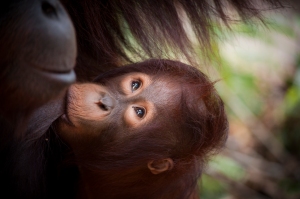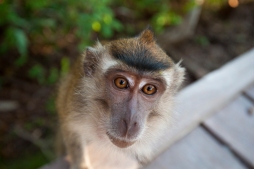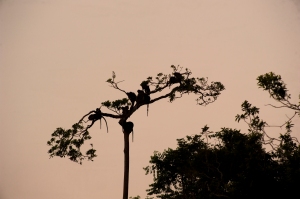What doest thou in heaven, O moon?
Say, silent moon, what doest thou?
Thou risest in the evening; thoughtfully
Thou wanderest o’er the plain,
Then sinkest to thy rest again.
And art thou never satisfied
With going o’er and o’er the selfsame ways?
Art never wearied? Dost thou still
Upon these valleys love to gaze?
How much thy life is like
The shepherd’s life, forlorn!
He rises in the early dawn,
He moves his flock along the plain;
The selfsame flocks, and streams, and herbs
He sees again;
Then drops to rest, the day’s work o’er;
And hopes for nothing more.
Tell me, O moon, what signifies his life
To him, thy life to thee? Say, whither tend
My weary, short-lived pilgrimage,
Thy course, that knows no end?
And old man, gray, infirm,
Half-clad, and barefoot, he,
Beneath his burden bending wearily,
O’er mountain and o’er vale,
Sharp rocks, and briars, and burning sand,
In wind, and storm, alike in sultry heat
And in the winter’s cold,
His constant course doth hold;
On, on, he, panting, goes,
Nor pause, nor rest he knows;
Through rushing torrents, over watery wastes;
He falls, gets up again,
And ever more and more he hastes,
Torn, bleeding, and arrives at last
Where ends the path,
Where all his troubles end;
A vast abyss and horrible,
Where plunging headlong, he forgets them all.
Such scene of suffering, and of strife,
O moon, is this our mortal life.
In travail man is born;
His birth too oft the cause of death,
And with his earliest breath
He pain and torment feels: e’en from the first,
His parents fondly strive
To comfort him in his distress;
And if he lives and grows,
They struggle hard, as best they may,
With pleasant words and deeds to cheer him up,
And seek with kindly care,
To strengthen him his cruel lot to bear.
This is the best that they can do
For the poor child, however fond and true.
But wherefore give him life?
Why bring him up at all,
If _this_ be all?
If life is nought but pain and care,
Why, why should we the burden bear?
O spotless moon, such _is_
Our mortal life, indeed;
But thou immortal art,
Nor wilt, perhaps, unto my words give heed.
Yet thou, eternal, lonely wanderer,
Who, thoughtful, lookest on this earthly scene,
Must surely understand
What all our sighs and sufferings mean;
What means this death,
This color from our cheeks that fades,
This passing from the earth, and losing sight
Of every dear, familiar scene.
Well must thou comprehend
The reason of these things; must see
The good the morning and the evening bring:
Thou knowest, thou, what love it is
That brings sweet smiles unto the face of spring;
The meaning of the Summer’s glow,
And of the Winter’s frost and snow,
And of the silent, endless flight of Time.
A thousand things to thee their secrets yield,
That from the simple shepherd are concealed.
Oft as I gaze at thee,
In silence resting o’er the desert plain,
Which in the distance borders on the sky,
Or following me, as I, by slow degrees,
My flocks before me drive;
And when I gaze upon the stars at night,
In thought I ask myself,
‘Why all these torches bright?
What mean these depths of air,
This vast, this silent sky,
This nightly solitude? And what am I?’
Thus to myself I talk; and of this grand,
Magnificent expanse,
And its untold inhabitants,
And all this mighty motion, and this stir
Of things above, and things below,
No rest that ever know,
But as they still revolve, must still return
Unto the place from which they came,–
Of this, alas, I find nor end nor aim!
But thou, immortal, surely knowest all.
_This_ I well know, and feel;
From these eternal rounds,
And from my being frail,
Others, perchance, may pleasure, profit gain;
To _me_ life is but pain.
My flock, now resting there, how happy thou,
That knowest not, I think, thy misery!
O how I envy thee!
Not only that from suffering
Thou seemingly art free;
That every trouble, every loss,
Each sudden fear, thou canst so soon forget;
But more because thou sufferest
No weariness of mind.
When in the shade, upon the grass reclined,
Thou seemest happy and content,
And great part of the year by thee
In sweet release from care is spent.
But when _I_ sit upon the grass
And in the friendly shade, upon my mind
A weight I feel, a sense of weariness,
That, as I sit, doth still increase
And rob me of all rest and peace.
And yet I wish for nought,
And have, till now, no reason to complain.
What joy, how much I cannot say;
But thou _some_ pleasure dost obtain.
My joys are few enough;
But not for that do I lament.
Ah, couldst thou speak, I would inquire:
Tell me, dear flock, the reason why
Each weary breast can rest at ease,
While all things round him seem to please;
And yet, if _I_ lie down to rest,
I am by anxious thoughts oppressed?
Perhaps, if I had wings
Above the clouds to fly,
And could the stars all number, one by one,
Or like the lightning leap from rock to rock,
I might be happier, my dear flock,
I might be happier, gentle moon!
Perhaps my thought still wanders from the truth,
When I at others’ fortunes look:
Perhaps in every state beneath the sun,
Or high, or low, in cradle or in stall,
The day of birth is fatal to us all.
 Kill time. Lose track of time. Time heals every wound. Time dilatation. Lost in the mists of time. A race against time. Personal time. Atomic time. Clock time.
Kill time. Lose track of time. Time heals every wound. Time dilatation. Lost in the mists of time. A race against time. Personal time. Atomic time. Clock time.
 How much do you work?
How much do you work? I would like to answer you differently, Dodi, with something less obvious but from my mouth the usual amazing, fabulous, extraordinary, nice, very nice, cool, very cool will come out. What should I say as I follow uncharted paths between high trees and observe very colorful butterflies brush against my nose. I cannot find any words when in the distance the leafy branches start to flutter and light starts to soak inch by inch: this is the sign that a nice, wild orangutan is coming. I see his little baby climb clumsily on the body of his mom, with his breezy pelt that comes of his little head.
I would like to answer you differently, Dodi, with something less obvious but from my mouth the usual amazing, fabulous, extraordinary, nice, very nice, cool, very cool will come out. What should I say as I follow uncharted paths between high trees and observe very colorful butterflies brush against my nose. I cannot find any words when in the distance the leafy branches start to flutter and light starts to soak inch by inch: this is the sign that a nice, wild orangutan is coming. I see his little baby climb clumsily on the body of his mom, with his breezy pelt that comes of his little head. n the jungle, you learn to recognize noises: nothing happens by chance. The creaking of trees, the falling of leafs: in the jungle chaos is rigor and harmony. Everything is linked. Everything has its own place. The jungle is noise and the concertchanges at every moment of the day. In the morning, you wake up with the gibbon’s alarm, then it’s the turn of river birds and macaques: ghastly cicadas, predators fishing, the nasal call of proboscis monkeys, the yell of apes.
n the jungle, you learn to recognize noises: nothing happens by chance. The creaking of trees, the falling of leafs: in the jungle chaos is rigor and harmony. Everything is linked. Everything has its own place. The jungle is noise and the concertchanges at every moment of the day. In the morning, you wake up with the gibbon’s alarm, then it’s the turn of river birds and macaques: ghastly cicadas, predators fishing, the nasal call of proboscis monkeys, the yell of apes. We passed slowly through the river, following the slowly decline of the day. It was impossible to sleep after 5 a.m. and not close your eyes around 7 p.m. Our days followed the rhythm of nature. No connection, no electricity: just a little flash light not to attract insects; simple restrooms; no running water; no smartphones. Yourself. Themselves. A camera. The great movie of the nature. “Hello People! Here the entertainment is the live streaming of the National Geographic Channel”. It is hard to take a nap. Too risky. By closing your eyes you might miss the sight of a wild animal. Equipped with a big zoom, the camera is always in my hands. But…sometimes…I would like to watch, just watch and take mental pictures. I would like to enjoy the moment, just the moment.
We passed slowly through the river, following the slowly decline of the day. It was impossible to sleep after 5 a.m. and not close your eyes around 7 p.m. Our days followed the rhythm of nature. No connection, no electricity: just a little flash light not to attract insects; simple restrooms; no running water; no smartphones. Yourself. Themselves. A camera. The great movie of the nature. “Hello People! Here the entertainment is the live streaming of the National Geographic Channel”. It is hard to take a nap. Too risky. By closing your eyes you might miss the sight of a wild animal. Equipped with a big zoom, the camera is always in my hands. But…sometimes…I would like to watch, just watch and take mental pictures. I would like to enjoy the moment, just the moment. In this movie we saw snakes race to conquer the other bank; we saw proboscis monkeys, white and black macaques, crocodiles, varanus, tarantulas, strange insects, tarsiers, colored birds. After getting off the boat and entering in the deep jungle we met a young orangutan on our path. We approached her shyly. We wanted to touch her: we shook her hands. Everything could have ended there, just there, because the moment is deeply wonderful.
In this movie we saw snakes race to conquer the other bank; we saw proboscis monkeys, white and black macaques, crocodiles, varanus, tarantulas, strange insects, tarsiers, colored birds. After getting off the boat and entering in the deep jungle we met a young orangutan on our path. We approached her shyly. We wanted to touch her: we shook her hands. Everything could have ended there, just there, because the moment is deeply wonderful. Gibbons fly above our heads like circus acrobats. Who knows – I think- how much our eyes aren’t seeing…but it is ok. The partiality is the best resource of tourists. We move from a camp to another. You can feel the docile and fragile balance of this ecosystem: palms’ plantations, arrogant deforestation, and worrisome climates’ changes menace virgin forest’s life. Here it is true: the beating of wings of a butterfly is felt instantly across the world. A typhoon is coming; it is ready to cancel what the evolution built.
Gibbons fly above our heads like circus acrobats. Who knows – I think- how much our eyes aren’t seeing…but it is ok. The partiality is the best resource of tourists. We move from a camp to another. You can feel the docile and fragile balance of this ecosystem: palms’ plantations, arrogant deforestation, and worrisome climates’ changes menace virgin forest’s life. Here it is true: the beating of wings of a butterfly is felt instantly across the world. A typhoon is coming; it is ready to cancel what the evolution built.
 The jungle thickens of this nocturnal population. We glide slowly on the river looking for a quiet place where to spend the night. There is no more light: klot, klot, klot, klot, klot…the engine’s noise never abandons us. The captain springs out his den to better observe the water: he intones a traditional melody that merges with nature. Stars riseand slide on palms’ branches glittered by thousands of fireflies. We sit at the bow watching silently this amazing live show. We can cry. We can laugh. Now, we can go back with the holy idea that God, here, in these places, has managed to paint a wonderful masterpiece. But it is already bright. We are again in the dust, in the filthy, in the thunderous noise, in the western cadence.
The jungle thickens of this nocturnal population. We glide slowly on the river looking for a quiet place where to spend the night. There is no more light: klot, klot, klot, klot, klot…the engine’s noise never abandons us. The captain springs out his den to better observe the water: he intones a traditional melody that merges with nature. Stars riseand slide on palms’ branches glittered by thousands of fireflies. We sit at the bow watching silently this amazing live show. We can cry. We can laugh. Now, we can go back with the holy idea that God, here, in these places, has managed to paint a wonderful masterpiece. But it is already bright. We are again in the dust, in the filthy, in the thunderous noise, in the western cadence. 1994, my first World Cup memory, the golden age of Roberto Baggio. Actually, I remember something even older… I have a mental picture of a set of keys in my grandmother’s front door with a keychain shape of Italy ’90. I was a year and a half old, it’s hard to say if it’s something that I have built a posteriori, a fictitious memory, or if it’s true reality but what might be true, can still be faked by our mind. In any case, a memory not lived, but nevertheless felt, has the same weight as a lived experience. If the magic nights of Italy ’90 are my first football memory, the second one is a toy, a mouse wearing Inter’s jersey on the shelf of Mario the barber: then, over the years, memories built up.
1994, my first World Cup memory, the golden age of Roberto Baggio. Actually, I remember something even older… I have a mental picture of a set of keys in my grandmother’s front door with a keychain shape of Italy ’90. I was a year and a half old, it’s hard to say if it’s something that I have built a posteriori, a fictitious memory, or if it’s true reality but what might be true, can still be faked by our mind. In any case, a memory not lived, but nevertheless felt, has the same weight as a lived experience. If the magic nights of Italy ’90 are my first football memory, the second one is a toy, a mouse wearing Inter’s jersey on the shelf of Mario the barber: then, over the years, memories built up. Lima Ronaldo, Djorkaeff, a young Andrea Pirlo, sold too soon to the Rossoneri cousins; then France 1998, magazines that my parents bought me, the poster of the Azzurri, Del Piero, Vieri, Baggio, Pagliuca .. and the mockery of the penalties lost against France with Barthez, Zizou, Henry, Trezeguet. Euro 2000 and the magical evening of Toldo in the extraordinary match against Netherlands and Trezeguet’s golden goal.
Lima Ronaldo, Djorkaeff, a young Andrea Pirlo, sold too soon to the Rossoneri cousins; then France 1998, magazines that my parents bought me, the poster of the Azzurri, Del Piero, Vieri, Baggio, Pagliuca .. and the mockery of the penalties lost against France with Barthez, Zizou, Henry, Trezeguet. Euro 2000 and the magical evening of Toldo in the extraordinary match against Netherlands and Trezeguet’s golden goal. 
 just a little hope at the beginning of the competition and nothing more. These memories are legendary: I was a teenager, I had just met Gio and it was a period of epic evenings enjoyed with friends, the celebrations that never end (a time when celebrating was a moral duty that was more important than the game itself). At every turn we found new ways to celebrate: my scooter hosting unthinkable loads; underwear wore on top of pants (white, red and green underwear as shown in a picture that still runs on the web) and then, the greatest of all, the famous red Punto that kept accepting new passengers match after match. The flamboyant Punto, led by my father -a skillful boatman of fools, became the base from which we started our water guns war: our original idea was soon imitated by everybody. At the final against France, we were at Renato’s place: a nightmare atmosphere, the jump in the pool after Grosso scored the last penalty, then we ran riding our scooters and from there directly to attack Nettuno’s streets: shirtless, joyful, in 18 on 4 wheels endured by our ecstasy. And after few days, the capitulation: I crashed with my loved Majestic 125, a very bad joke played by two French people unable of reading the STOP sign.
just a little hope at the beginning of the competition and nothing more. These memories are legendary: I was a teenager, I had just met Gio and it was a period of epic evenings enjoyed with friends, the celebrations that never end (a time when celebrating was a moral duty that was more important than the game itself). At every turn we found new ways to celebrate: my scooter hosting unthinkable loads; underwear wore on top of pants (white, red and green underwear as shown in a picture that still runs on the web) and then, the greatest of all, the famous red Punto that kept accepting new passengers match after match. The flamboyant Punto, led by my father -a skillful boatman of fools, became the base from which we started our water guns war: our original idea was soon imitated by everybody. At the final against France, we were at Renato’s place: a nightmare atmosphere, the jump in the pool after Grosso scored the last penalty, then we ran riding our scooters and from there directly to attack Nettuno’s streets: shirtless, joyful, in 18 on 4 wheels endured by our ecstasy. And after few days, the capitulation: I crashed with my loved Majestic 125, a very bad joke played by two French people unable of reading the STOP sign.






